Fall 2021 - Spring 2022
Audrey Watters (Hack Education): "Teaching Machines: The History of Personalized Learning"
February 17, 2022, 4:00 p.m.
Audrey Watters speaks about her latest book, Teaching Machines: The History of Personalized Learning (MIT Press), which tells the pre-digital history of “personalized learning.” Watters demonstrates that the history of ed tech does not begin with videos on the internet, or even with the personal computer. Her book instead focuses on early twentieth-century teaching machines, the psychological theories that underpinned them, how they were reported on in the media, and how they shaped and were shaped by the cultures in which they were produced.
Wendy Hui Kyong Chun (New Media, Simon Fraser University): "Discriminating Data"
November 18, 2021, 1:00 p.m.
In this conversation, Wendy Hui Kyong Chun (SFU’s Canada 150 Research Chair in New Media) will discuss themes from her new book Discriminating Data (published November 2, 2021, MIT Press) about how big data and predictive machine learning currently encode discrimination and create agitated clusters of comforting rage. Chun will explore how polarization is a goal—not an error—within current practices of predictive data analysis and machine learning for these methods encode segregation, eugenics, and identity politics through their default assumptions and conditions. Correlation, which grounds big data’s predictive potential, stems from twentieth-century eugenic attempts to “breed” a better future. Recommender systems foster angry clusters of sameness through homophily. Users are “trained” to become authentically predictable via a politics and technology of recognition. The predictive programs thus seek to disrupt the future by making disruption impossible.
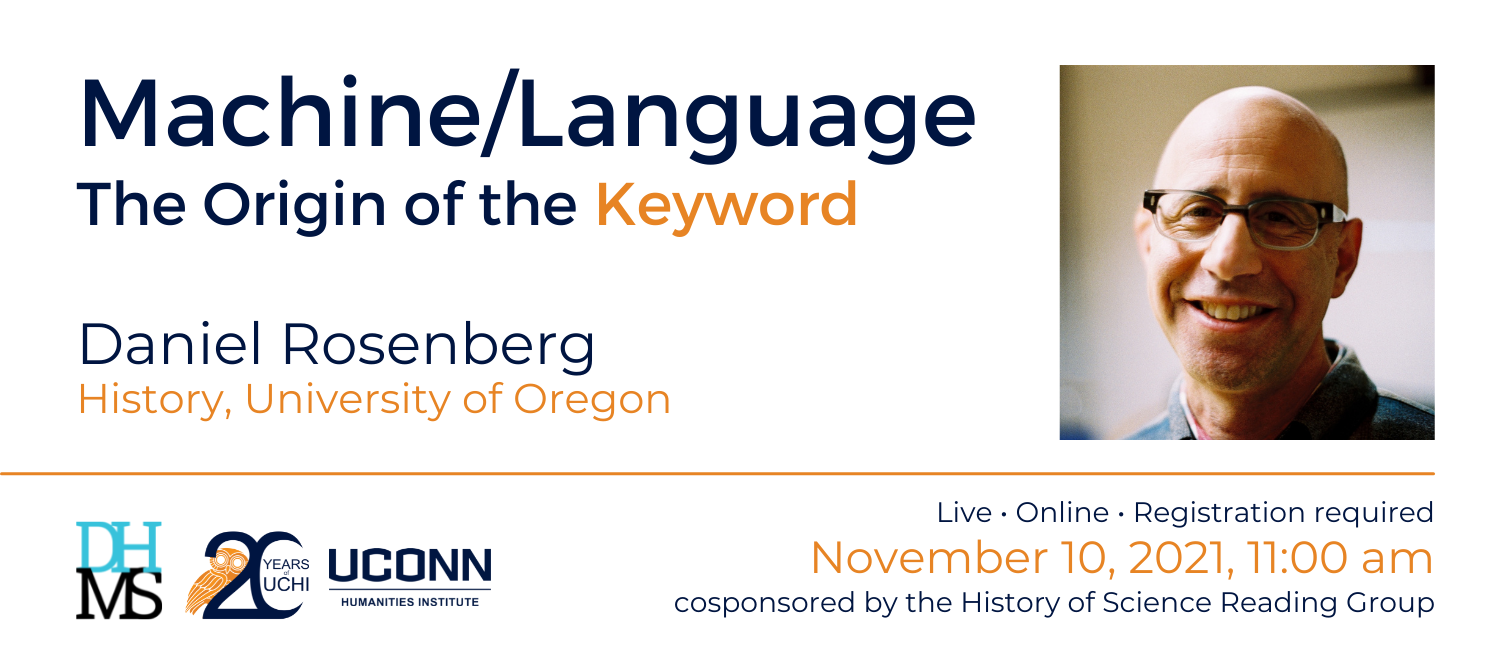
Daniel Rosenberg (History, University of Oregon): "Machine/Language: The Origin of the Keyword"
November 10, 2021, 11:00 a.m.
There may be no word more emblematic of our information age than keyword itself, but the ubiquity of the term belies its complexity. Distinct concepts of the keyword were articulated in information theory and in cultural studies beginning in the late 1950s. With the rise of the Web in the 1990s, however, these differing concepts were bound together. The story of this hybridization provides insight into the process by which computers became mediators of culture during the second half of the twentieth century as well as the importance of cultural studies to our understanding of computers.

Jessica Marie Johnson (History, Johns Hopkins University) and Kim Gallon (History, Purdue University): "Black Beyond Data"
October 25, 2021, 4:00 p.m.
Jessica Marie Johnson and Kim Gallon are co-Principal Investigators of Black Beyond Data, a new project backed by a $300,000 Mellon grant. Connecting the fields of digital humanities, Black studies, and data and computation, the project seeks to create an open resource for scholars to combat racial injustice through digital humanities.

Algorithmic Arts and Humanities at UConn
Kyle Booten (English), Sue Huang (DMD), Stefan Kaufmann (Linguistics), and Anna Lindemann (DMD)
October 21, 2021, 12:30 p.m.
“Algorithmic Arts & Humanities” will feature presentations by four faculty members from various disciplines at UConn. Their innovative artworks, research, and scholarship draw on computational methods, and range from those incorporating natural language processing and machine learning to generative musical composition.
Fall 2020 - Spring 2021
Simon Burrows (Professor of History, Western Sydney University): "Enlightenment in Ledgers: Digitally Mapping the French Book Trade"
April 21, 2021, 6:30 p.m.
This paper brings together book trade, customs, and licensing evidence from old regime France in an industrial level survey of the dissemination of books. It will discuss sources, data processing, and digital methods and platforms used in the French Book Trade in Enlightenment Europe, before assessing how far digital analysis revises our understandings of the literary field, including the efficacy of the French book police, the reception of enlightenment texts, popular religiosity, or even how the French paper industry helped shape literary production on the eve of the revolution of 1789. The paper will also discuss future prospects and challenges for historical bibliometric research.
Shaoling Ma (Humanities, Yale-NUS): "What Do Media Do? The ‘Case’ of Late Qing China, 1861–1906"
February 22, 2021, 6:00 p.m.
During the last few decades of the Manchu Qing dynasty (1644–1912), writers, intellectuals, reformers, and revolutionaries grasped what it is that media do even as they did not yet employ a distinct term for communicative media (meiti) as such. My talk, largely based on my forthcoming book, The Stone and the Wireless, Mediating China 1861-1906, asserts that media do not mediate between this and that entity before first mediating between some version of its already mediated form as discursive representations in texts and images, and the apparently unmediated technical device or process.
Radical Futures – Imagining the Media of Tomorrow
March 20-21, 2021
Organized by Anke Finger (UConn) and Christoph Ernst (University of Bonn)
The Radical Futures symposium brings together researchers from Germany and the US to discuss both the future of media and form(at)s of imagination/imaginaries in the 21st century. Central to the discussion is the role of knowledge of the future for the imagination of digital media in a variety of potential social contexts. How can our imagination contribute to knowing the future? Which kinds of imaginaries do we consult for this purpose? Whose imagination/imaginaries receive(s) a voice? What past imaginations/imaginaries have infused the present? What diverse digital media can we conjure up for futures that may not reflect who we are today? What truths are available today that inform realities to come?
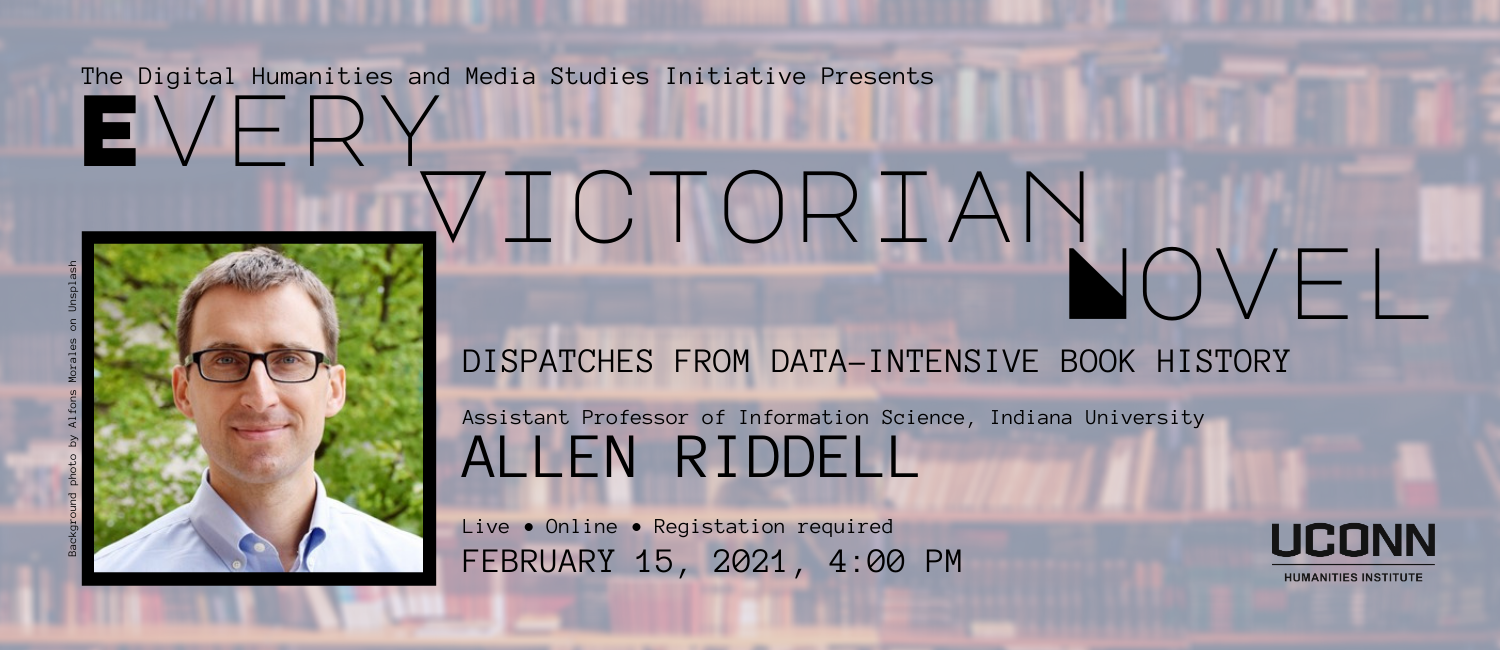
Allen Riddell (Information Science, Indiana): "Every Victorian Novel: Dispatches from Data-Intensive Book History"
February 15, 2021, 4:00 p.m.
This talk reviews three recent contributions to the history of fiction publishing in the British Isles and Ireland during the 19th century. The three papers share an investment in an inclusive history of the novel and of novel-writing as a profession. They depend on, to varying degrees, the availability of machine-readable bibliographies and of digital surrogates of volumes held by legal deposit libraries (e.g., Oxford's Bodleian, British Library).
Kristin Jensen (University of Virginia) and Michael Rodriguez (UConn Library): Book Traces
November 18, 2020, 1:00 p.m.
Kristin Jensen, project manager for Book Traces based at the University of Virginia, will speak about “finding cool stuff in old books” at a time when American college libraries are turning towards mass digitization, shared print consortia, and efforts to manage down the size of print collections. Michael Rodriguez will speak to the UConn Library's participation in Book Traces, share intriguing examples of marginalia discovered in our collections, and situate Book Traces in a larger context of library collections and strategies.
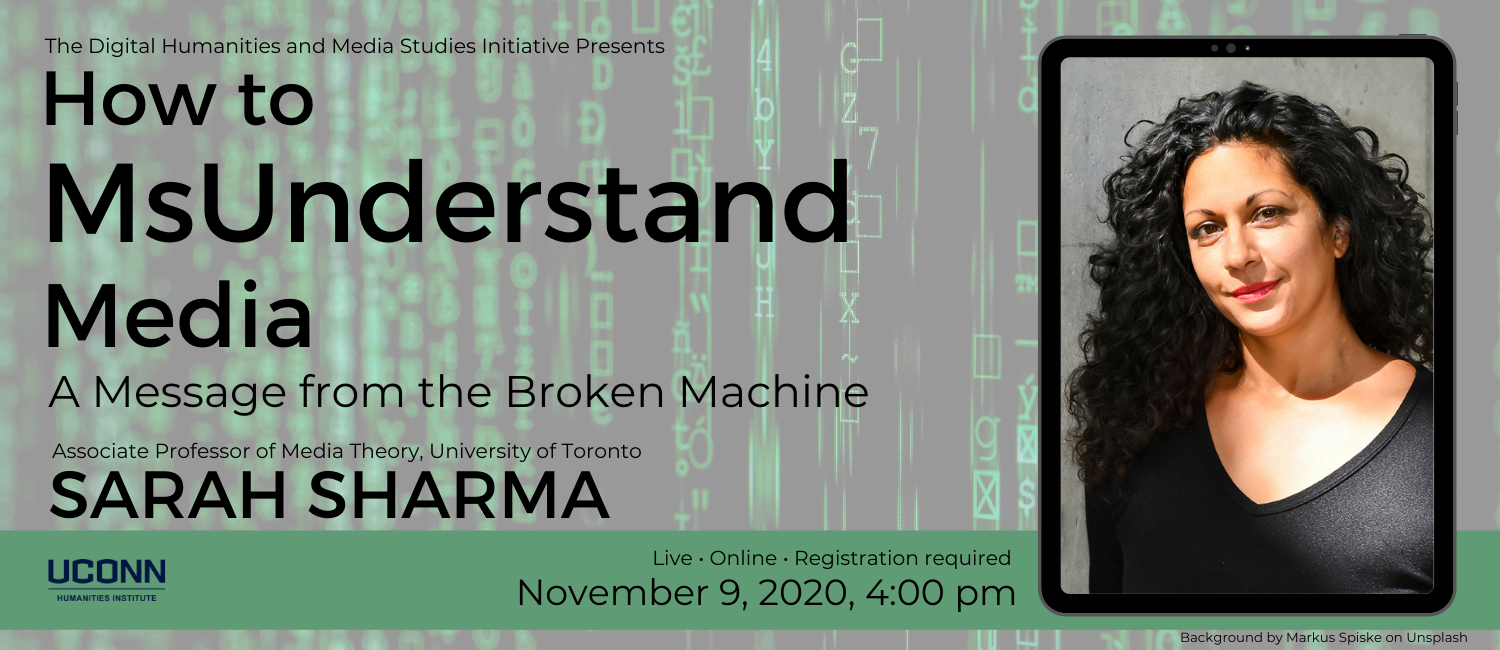
Sarah Sharma (Director, McLuhan Centre for Culture and Technology, University of Toronto): "How to MsUnderstand Media: A Message from the Broken Machine"
November 9, 2020, 4:00 p.m.
Sarah is currently at work on two projects that take up McLuhan's media theory for feminist ends. The first is a monograph tentatively titled Broken Machine Feminism which explores the relationship between technology and patriarchal cultures of exit. This project argues for the necessity of a feminist techno-determinist stance in order to address contemporary power dynamics as they intersect with the technological. The second is an edited book collection, MsUnderstanding Media: A Feminist Medium is the Message (with Rianka Singh), which offers a feminist retrieval of McLuhan's famous adage that the medium is the message. This talk will outline Sarah's work on a feminist approach to McLuhan and her argument for the new possibilities of a feminist techno-determinism.
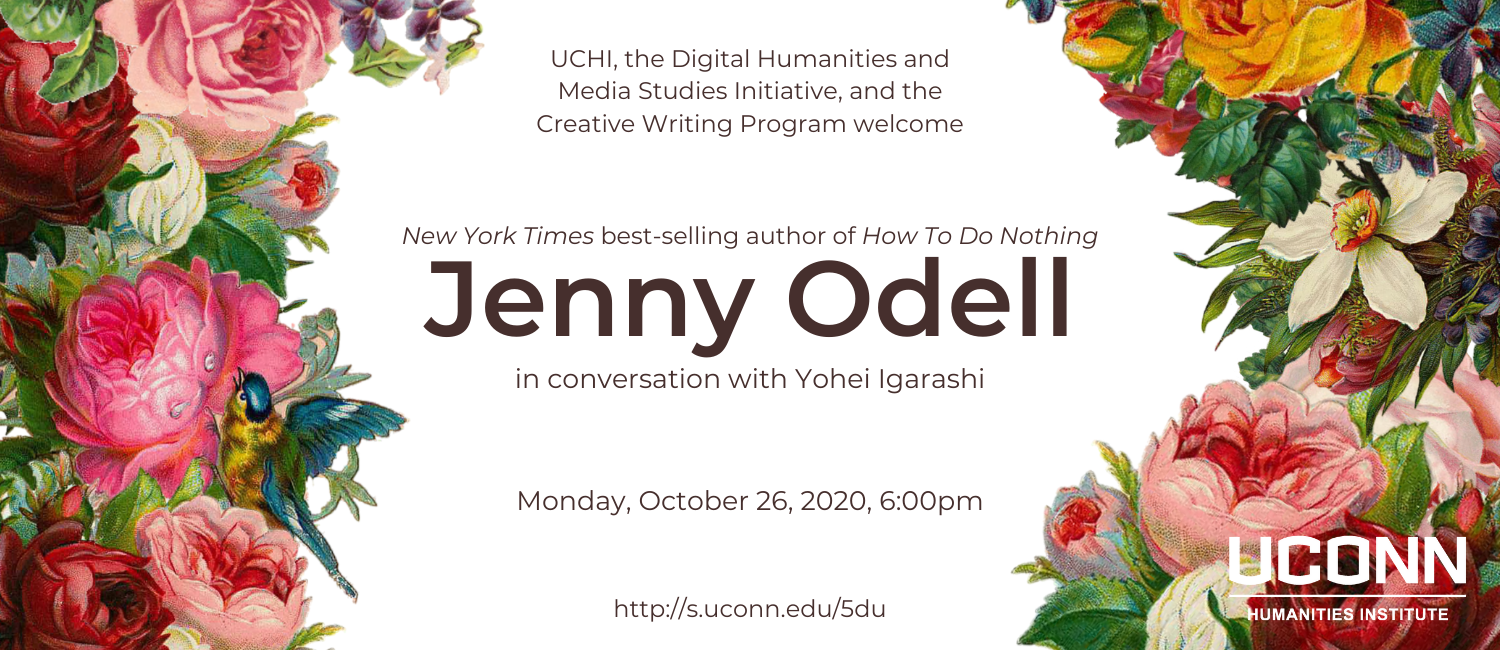
Jenny Odell (Author of How to Do Nothing: Resisting the Attention Economy)
October 26, 2020, 6:00 p.m.
Multi-disciplinary artist and New York Times best-selling author of How to Do Nothing: Resisting the Attention Economy (2019), Jenny Odell, in conversation with Yohei Igarashi.
Fall 2019 - Spring 2020
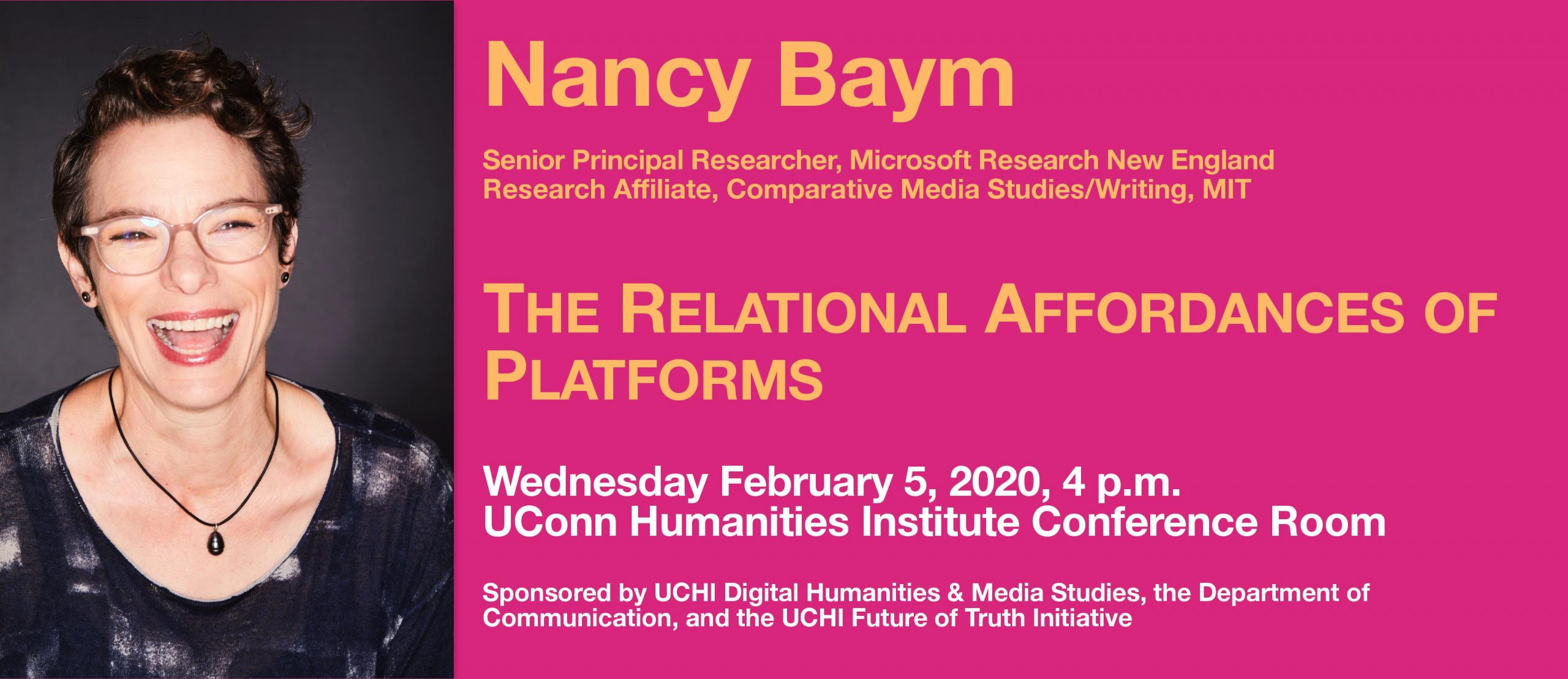
Nancy Baym (Senior Principal Researcher, Microsoft Research New England;
Research Affiliate, Comparative Media Studies/Writing, MIT):
"The Relational Affordances of Platforms"
February 5, 2020, 4:00 p.m.
People have been socializing on the internet for nearly fifty years. In recent years, online social life has become increasingly concentrated in a relatively small number of commercial platforms. How can we make sense of the impacts they are having on our relational lives? How can we theorize platforms when they are constantly changing and used in so many different ways? In this talk, Nancy Baym draws on a range of her recent research on platforms such as Facebook and Twitter to articulate a model for understanding platforms as the dynamic, unstable entities they are, and to explore their roles in shaping, constraining and opening up new possibilities for relationships in contexts ranging from close romantic bonds to online communities and the ties that connect musicians to their audiences. The talk further considers how these platforms commodify the relational interactions that take place through them, and how their design choices have fostered environments in which relationships become tools for profit.
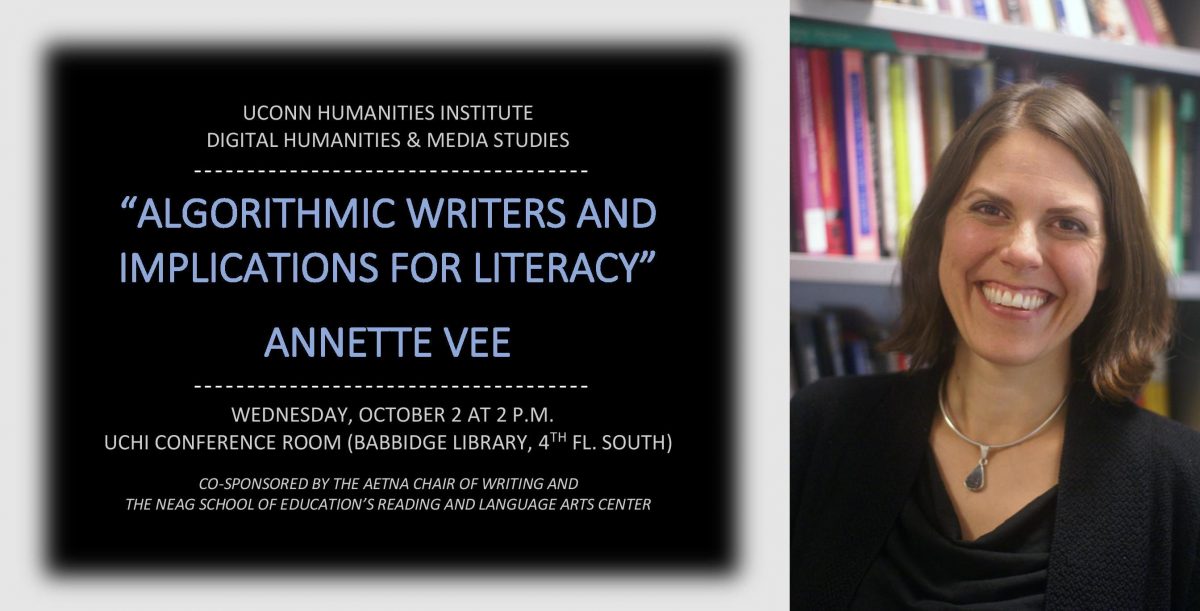
Annette Vee (English, University of Pittsburgh)
October 2, 2019, 2:00 p.m.
Writing today is inextricable from computation: we write on and for computers. But computers are no longer just word processors or distributors of our writing. Algorithms, which enter our lives through computers and crowd our writing spaces, affect what we write, who reads it, and how. Algorithms read our emails in order to write our emails. They correct our grammar, they can summarize and simplify texts, and they choose what we read online. If you write on or with computers (and you do), your algorithmic coauthors influence what you write and how you write it. Algorithms are more active agents than pencils or coffeeshops—other materialities that affect our writing processes—and they have complex relationships to the humans who produce and use them. What is literacy when it’s learned, performed, and subjected to algorithmic writers? And how should literacy be taught in the context of ubiquitous algorithmic writing? In this talk, Annette Vee will describe contemporary scenes of algorithmic writing, place them in the history of literacy and computation, and present some implications and applications for literacy learning now.
Spring 2019 and Prior
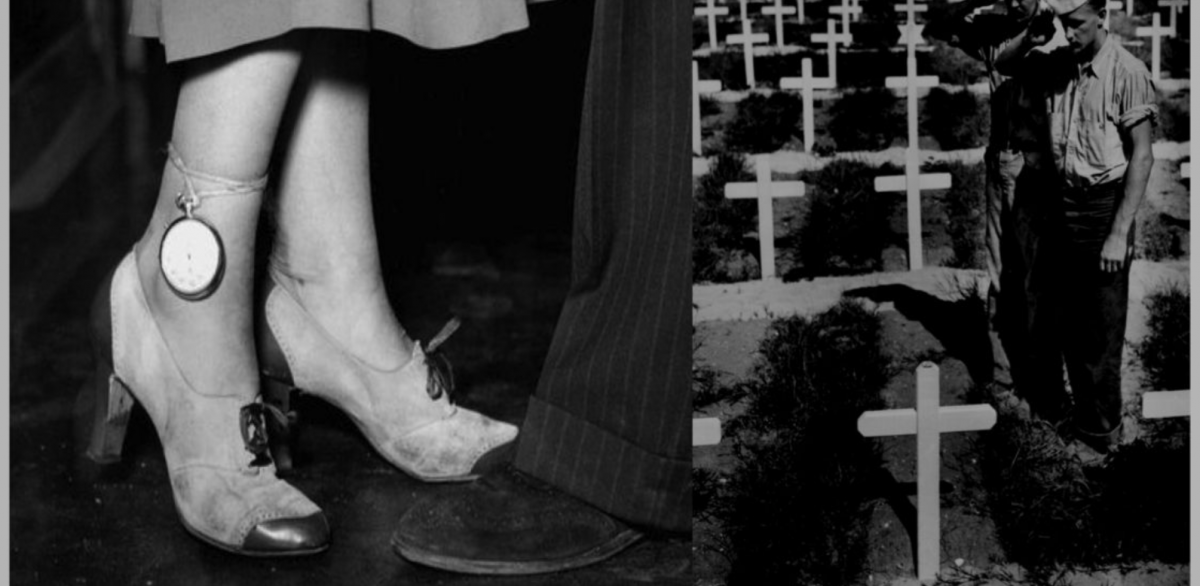
"Numbered Lives: A Feminist Media History"
Jacqueline Wernimont, Dartmouth College
Distinguished Chair of Digital Humanities and Social Engagement & Associate Professor of Women’s, Gender, and Sexuality Studies, Dartmouth College
February 28, 12-2:00pm, The Heritage Room, Babbidge Library
Jacqueline Wernimont is an anti-racist, feminist scholar working toward greater justice in digital cultures. She writes about long histories of media and technology – particularly those that count and commemorate — and entanglements with archives and historiographic ways of knowing. She is a network weaver across humanities, arts, and sciences. This work includes co-Directing HASTAC and Dartmouth’s Digital Humanities and Social Engagement Cluster.
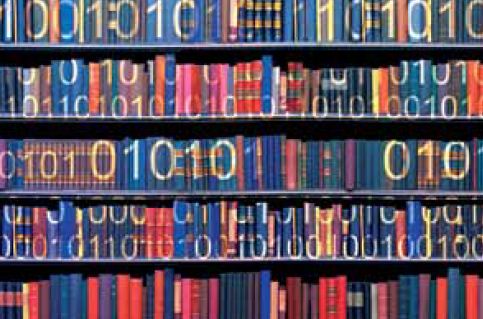
"Digital Scholarship and Graduate Education at UConn"
March 28, 12-2:00pm, The Heritage Room, Babbidge Library
What is the status of digital scholarship and digital humanities in graduate education? Does it play a role in the job market? What training do our graduate students need? What resources are necessary to facilitate digital scholarship? What are the challenges involved in teaching across departments? How can we facilitate interdisciplinary study, including co-teaching across departments, that digital scholarship requires? What are discipline-specific opportunities or challenges? And what about funding and skill sets? Come and discuss these and additional questions during a luncheon meet at the Humanities Institute.
This is an informal meeting for Directors of Graduate Study and graduate students. All interested in the topic welcome.
With Anke Finger and Tom Scheinfeldt

DHMS Talk: "The Media of Weather"
John Durham Peters, Yale University
María Rosa Menocal Professor of English and of Film & Media Studies
April 25, 12-2:00pm, The Heritage Room, Babbidge Library
John teaches and writes on media history and philosophy. He is the María Rosa Menocal Professor of English and of Film & Media Studies at Yale University. He taught at the University of Iowa between 1986-2016. He is the author of Speaking into the Air: A History of the Idea of Communication, Courting the Abyss: Free Speech and the Liberal Tradition, and most recently, The Marvelous Clouds: Toward a Philosophy of Elemental Media.
His first book ''Speaking into the Air: A History of the Idea of Communication'' which traces out broad historical, philosophical, religious, cultural, legal, and technological contexts for the study of communication. His second book Courting the Abyss: Free Speech and the Liberal Tradition updates the philosophy of free expression with a history of liberal thought since Paul of Tarsus. His most recent book The Marvelous Clouds: Toward a Philosophy of Elemental Media radically rethinks how media are environments and environments are also media. He has held fellowships with the National Endowment for the Humanities, the Fulbright Foundation, and the Leverhulme Trust.
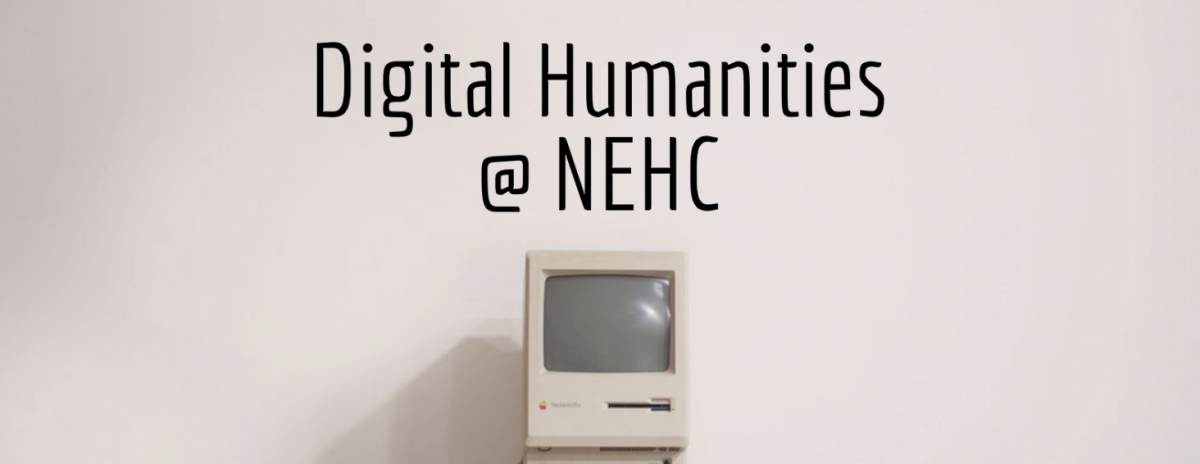
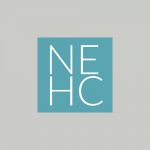
"Day of NEHC-DH: Digital Scholarship in New England"
10-4pm, May (precise date TBD), UCHI Conference Room, Babbidge Library
UConn will host the first "Day of NEHC-DH" to facilitate and promote networking, discussion and collaboration amongst digital humanities scholar-practitioners from NEHC member institutions. For more information or to offer suggestions please contact anke.finger@uconn.edu.
Multimodal Publishing
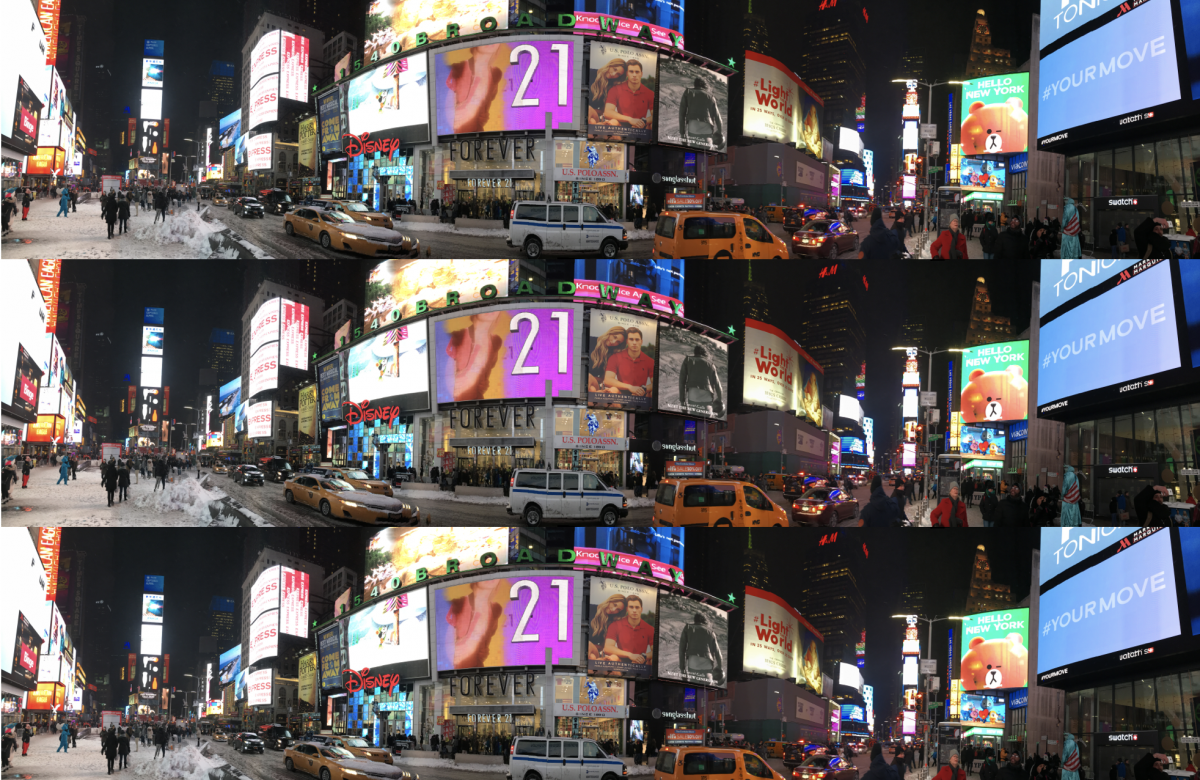
Fall 2018
DHMS Roundtable: "Multimodal Publishing and Public Scholarship"
November 6, 2-3:30pm, The Heritage Room, Babbidge Library
With Cheryl Ball (Wayne State University) and Kathleen Fitzpatrick (Michigan State University) and Kathy Labadorf (UConn). Moderated by Brenda Brueggemann, Aetna Chair of Writing.
Cheryl E. Ball is Director of the Digital Publishing Collaborative at Wayne State University Library. Since 2006, Ball has been editor of the online peer-reviewed open-access journal Kairos: Rhetoric, Technology, and Pedagogy, which exclusively publishes digital media scholarship. Her recent research in editorial workflows and digital publishing infrastructures can be found in multiple journals and edited collections, as well as on her personal repository, http://ceball.com. She is the Project Director for Vega, an open-access multimedia academic publishing platform, and serves as the executive director of the Council of Editors of Learned Journals.
Kathleen Fitzpatrick is Director of Digital Humanities and Professor of English at Michigan State University. Prior to assuming this role in 2017, she served as Associate Executive Director and Director of Scholarly Communication of the Modern Language Association, where she was Managing Editor of PMLA and other MLA publications. During that time, she also held an appointment as Visiting Research Professor of English at NYU. She is author of Generous Thinking: The University and the Public Good (Johns Hopkins University Press, forthcoming), as well as Planned Obsolescence: Publishing, Technology, and the Future of the Academy (NYU Press, 2011) and The Anxiety of Obsolescence: The American Novel in the Age of Television (Vanderbilt University Press, 2006). She is project director of Humanities Commons, an open-access, open-source network serving more than 14,700 scholars and practitioners in the humanities.
Kathy Labadorf began work in UConn’s Babbidge Library in 1998 and has been the Open Educational Resources (OER) Librarian for the University of Connecticut since the Open and Affordable Initiative began in 2015. Faculty at all UConn campuses and in many disciplines are currently using open textbooks or have created and/or modified educational resources for their courses. A full description of the Initiative can be found at open.uconn.edu. Prior to her library career, Labadorf was an itinerant professional musician and instructor for 25 years.
Co-sponsored by the Aetna Chair of Writing.
Digital Tools in the (Language) Classroom
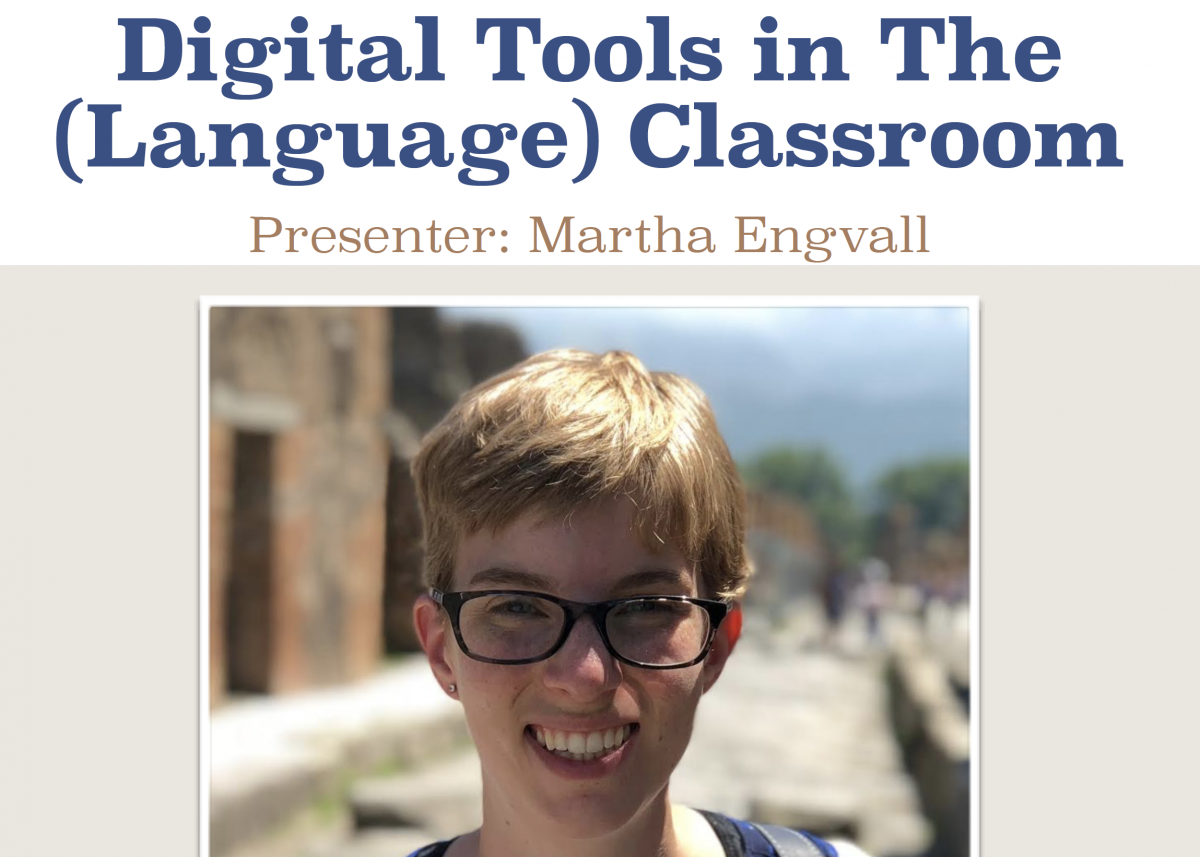
Tech-Day Series Workshop 1 with Martha Engvall
September 18, 2018, 1:30pm-2:30pm
Where? Oak Hall 205
Additional Information: Please bring your own device (smartphone, tablet, or similar)
Organized by Britta Meredith, Multimedia Language Center Coordinator | Department of Literatures, Cultures, and Languages
Everybody welcome, for more information please contact the organizer at: britta.meredith@uconn.edu
Podcasting for beginners with Dorothy Perugini

Tech-Day Series Workshop 2 with Dorothy Perugini
Podcasting for Beginners
October 10, 1-2pm
Project Lab 205, Oak Hall
Organized by Britta Meredith, Multimedia Language Center Coordinator | Department of Literatures, Cultures, and Languages
Everybody welcome, for more information please contact the organizer at: britta.meredith@uconn.edu
Open Access, Open Source, E-Journal and Digital Commons with Charles LeBel

Tech-Day Series Workshop 3 with Charles LeBel
Open Access, Open Source, E-Journal and Digital Commons
October 19, 3-4pm
Project Lab 205, lead organizer: Simone Puleo
Multimedia Language Center Coordinator | Department of Literatures, Cultures, and Languages
Everybody welcome, for more information please contact the organizer at: simone.puleo@uconn.edu
Liquidation of Jewish Ghettos
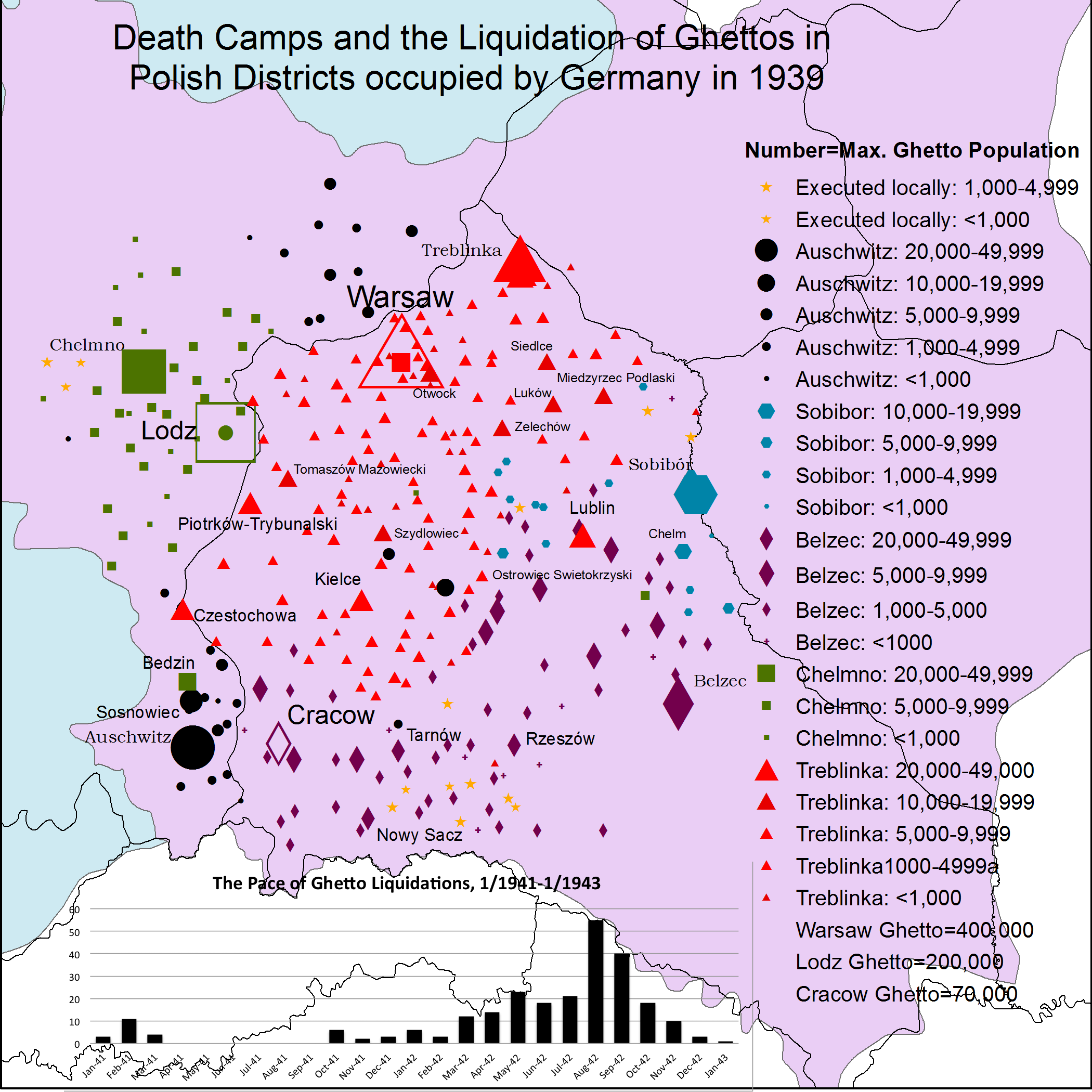
SPRING 2018
"Ghettos and Death Camps in German Occupied Poland 1939-1943 - What the Digital Humanities and Spatial Evidence Tell Us"
DHMS Talk by Helmut Walser Smith (Vanderbilt University)
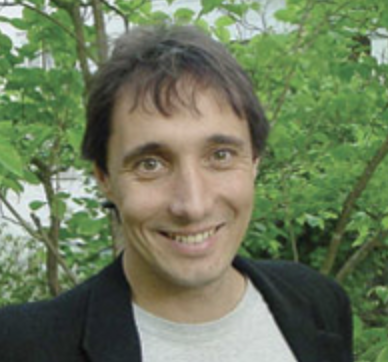 Martha Rivers Ingram Chair of History; Professor of German Studies
Martha Rivers Ingram Chair of History; Professor of German Studies
Director, Digital Humanities
4-6pm, Thursday, February 8th, The Heritage Room, Babbidge Library 4th Floor
Helmut Walser Smith is a historian of modern Germany, with particular interests in the history of nation-building and nationalism, religious history, and the history of anti-Semitism. He is the author of German Nationalism and Religious Conflict, 1870-1914 (Princeton, 1995), and a number of edited collections, including The Oxford Handbook of Modern German History (Oxford, 2011), Protestants, Catholics and Jews in Germany, 1800-1914 (Oxford, 2001), The Holocaust and other Genocides: History, Representation, Ethics (Nashville, 2002), and, with Werner Bergmann and Christhard Hoffmann, Exclusionary Violence: Antisemitic Riots in Modern German History (Ann Arbor, 2002). His book, The Butcher's Tale: Murder and Anti-Semitism in a German Town (New York, 2002), received the Fraenkel Prize in Contemporary History and was an L.A. Times Non-Fiction Book of the Year. It has also been translated into French, Dutch, Polish, and German, where it received an accolade as one of the three most innovative works of history published in 2002. Smith has also authored The Continuities of German History: Nation, Religion, and Race across the Long Nineteenth Century(Cambridge University Press, 2008), and is presently working on a book on German conceptions of nation before, during, and after nationalism.
Sponsored by Judaic Studies and History.
Frederick Douglass’ speaking locations in the UK from 1845-1886
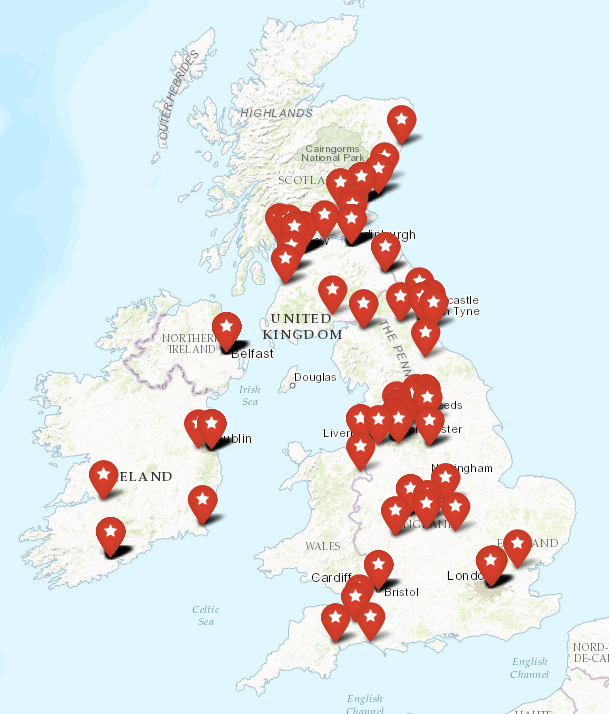
"'With Almost Electric Speed': Mapping Frederick Douglass' Journey in Britain"
Presented by Hannah Murray-Rose, Tuesday, February 20th, 12:30-2pm, UCHI conference room. Lunch served.
Hannah Murray-Rose received her Ph.D. from the Department of American and Canadian Studies at the University of Nottingham and is a visiting Fellow at the Gilder Lehrman Centre at Yale University. Her thesis analyses the legacy of formerly 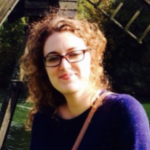 enslaved African Americans on British society and the myriad ways they resisted British racism.
enslaved African Americans on British society and the myriad ways they resisted British racism.
Individuals such as Frederick Douglass, Moses Roper, William and Ellen Craft, Henry ‘Box’ Brown and Josiah Henson used a variety of different performative techniques to counter racial stereotypes that people of African descent were inferior. They exploited abolitionist networks and the emerging industrialism in British society to travel thousands of miles and give hundreds of lectures.
All Tech Is Human
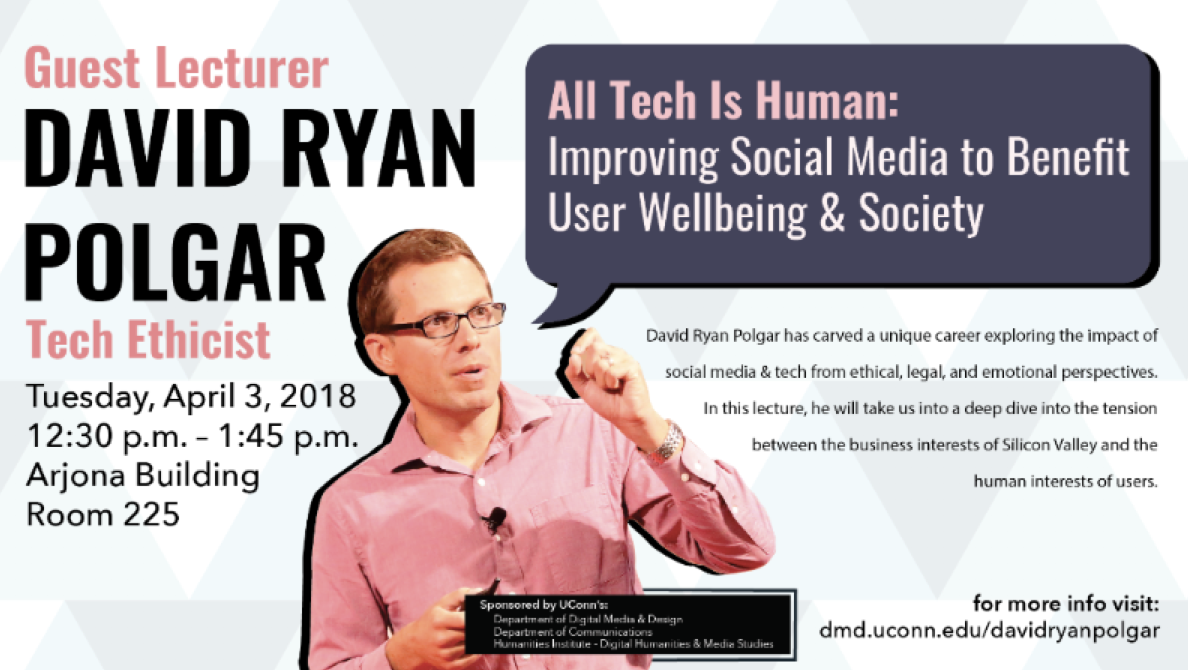
David is a tech writer (Big Think, Quartz, IBM thinkLeaders, and Dell Perspectives), speaker (3-time TEDx, The School of The New York Times), and frequent tech commentator (SiriusXM, CNN.com, HuffPost, BBC.com). He has experience working with startups and social media companies and co-founded the global Digital Citizenship Summit (held at Twitter HQ in 2016). Outside of writing and speaking, David currently serves as Trust & Safety for the teen virtual world, Friendbase. He is also a board member for the non-profit #ICANHELP, which recently held the first annual #Digital 4Good event to promote student empowerment and positive tech use. David recently started All Tech Is Human, an initiative to better align the business interests of tech companies with the human interests of users & society (wellbeing, vibrant and safe online environment, trustworthy content).
TWO Events on April 3rd, 12:30pm and 4pm:
JOIN David at 4pm in the Heritage Room in Babbidge Library for coffee and hear more from him on “How to build a better web,” based on Tim Berners-Lee’s recent thoughts on changes to the web.
Meet designer Kelly Walters, Assistant Professor in Art and Art History
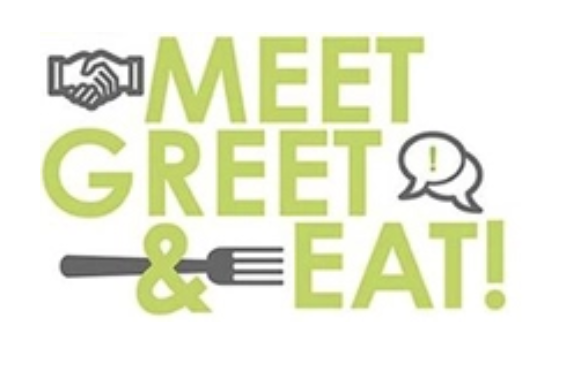
DHMS Meet&Greet
"Black Gesture in Animated Reaction GIFs: Their Impact on Social Media and Blackface Legacy in the United States"
12:30-2pm, Wednesday, April 4th, UCHI conference room
Presented by Kelly Walters (Art/Art History), Assistant Professor and multimedia designer, who works at the intersection of black cultural identity, representation, and language in mainstream media.
All welcome, open discussion of projects, ideas, tools, Q&A, brainstorming. UCHI conference room. Lunch served.
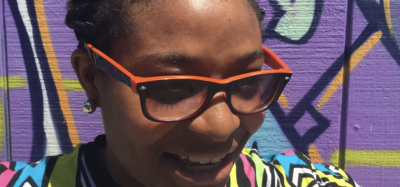
Past Events
Fall 2017
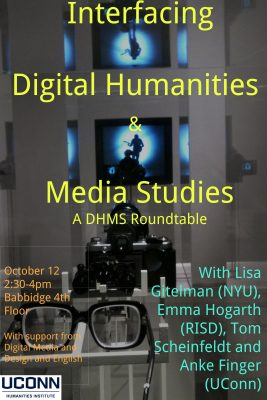 DHMS Roundtable, October 12, 2:30-4pm, UCHI Conference Room
DHMS Roundtable, October 12, 2:30-4pm, UCHI Conference Room
"Interfacing Digital Humanities & Media Studies." With Lisa Gitelman, Emma Hogarth, Tom Scheinfeldt, and moderated by Anke Finger.
Video of the event available on youtube.
Spring 2017
DHMS TALK, February 23, 4pm, 205 Laurel Hall
Alan Liu: "Toward Critical Infrastructure Studies: Digital Humanities, New Media Studies, and the Culture of Infrastructure"(University of California, Santa Barbara)
In an era when complexly "smart" and hybrid material-virtual infrastructures ranging from the micro to the macro scale seem to obviate older distinctions between material base and cultural superstructure, how can the digital humanities and new media studies join in an emergent "critical infrastructure studies"? What are the traditions of such studies? What is the topic's scope? What are some especially high-value areas for intervention by digital humanists and new media scholars/artists? And how can digital scholars in the humanities and arts collaborate with digital social scientists taking up similar matters? In this talk, Alan Liu considers the hypothesis that today's "cultural studies" is a mode of critical infrastructure studies.
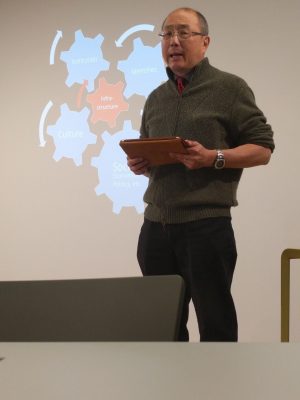 Bio: Alan Liu is Professor in the English Department at the University of California, Santa Barbara. He has published books titled Wordsworth: The Sense of History (1989); The Laws of Cool: Knowledge Work and the Culture of Information (2004); and Local Transcendence: Essays on Postmodern Historicism and the Database (2008). Liu is founder and co-leader of the 4Humanities.org advocacy initiative. Currently he is leading the 4Humanities.org big-data, topic-modeling project titled "WhatEvery1Says" on public discourse about the humanities.
Bio: Alan Liu is Professor in the English Department at the University of California, Santa Barbara. He has published books titled Wordsworth: The Sense of History (1989); The Laws of Cool: Knowledge Work and the Culture of Information (2004); and Local Transcendence: Essays on Postmodern Historicism and the Database (2008). Liu is founder and co-leader of the 4Humanities.org advocacy initiative. Currently he is leading the 4Humanities.org big-data, topic-modeling project titled "WhatEvery1Says" on public discourse about the humanities.
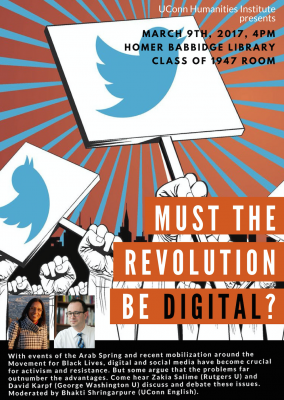 PANEL DISCUSSION, March 9, 4pm, Homer Babbidge Library Room Class of 1947
PANEL DISCUSSION, March 9, 4pm, Homer Babbidge Library Room Class of 1947
"Must the Revolution be Digital?"
With events of the Arab Spring and recent mobilization around the Movement for Black Lives, digital and social media have become crucial for activism and resistance. But some argue that the problems far outnumber the advantages. Join us to debate these issues!
Moderated by Bakhti Shringarpure (UConn English).
With Zakia Salime (Rutgers University) and David Karpf (George Washington University), please see DH Reading group above for more information.
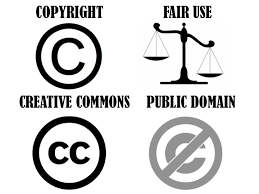 MINI CONFERENCE, April 14, 8:30am-2pm, UCHI Conference Room
MINI CONFERENCE, April 14, 8:30am-2pm, UCHI Conference Room
Copyright and Authors’ Rights in Scholarship
A Workshop organized by Jennifer Snow/Babbidge Library and hosted by DHMS/UCHI
SPRING 2017
Get-Togethers
February 16, 12:30-2:30: DHMS Meet&Greet (new members welcome, presentation of projects, Q&A, DHMS brainstorming) UCHI conference room. Lunch served.
February 24, 10-11: Digital Scholarship Coffee Hour (informal get-together, all invited) UCHI open area.
March 31, 10-11: Digital Scholarship Coffee Hour, UCHI open area.
Digital Humanities Reading Group (Chair: Bhakti Shringarpure)
February 13, 10-12: UCHI conference room
Analytic Activism: Digital Listening and the New Political Strategy by David Karpf (Oxford University Press, 2016)
Freedom without Permission: Bodies and Space in the Arab Revolutions Editor(s): Frances S. Hasso, Zakia Salime (Duke University Press, 2016)
Workshops by Scholars' Collaborative
February 13, 3-4pm: Digital Commons with Marisol Ramos (EC-1 on Level 1)
March 7, 11-12noon: Omeka with Jennifer Snow (EC-1 on Level 1)
March 8, 3-4pm: CartoDB (mapping) (EC-1 on Level 1)
April 13, 11-12noon: WordPress with Jennifer Snow (EC-1 on Level 1)